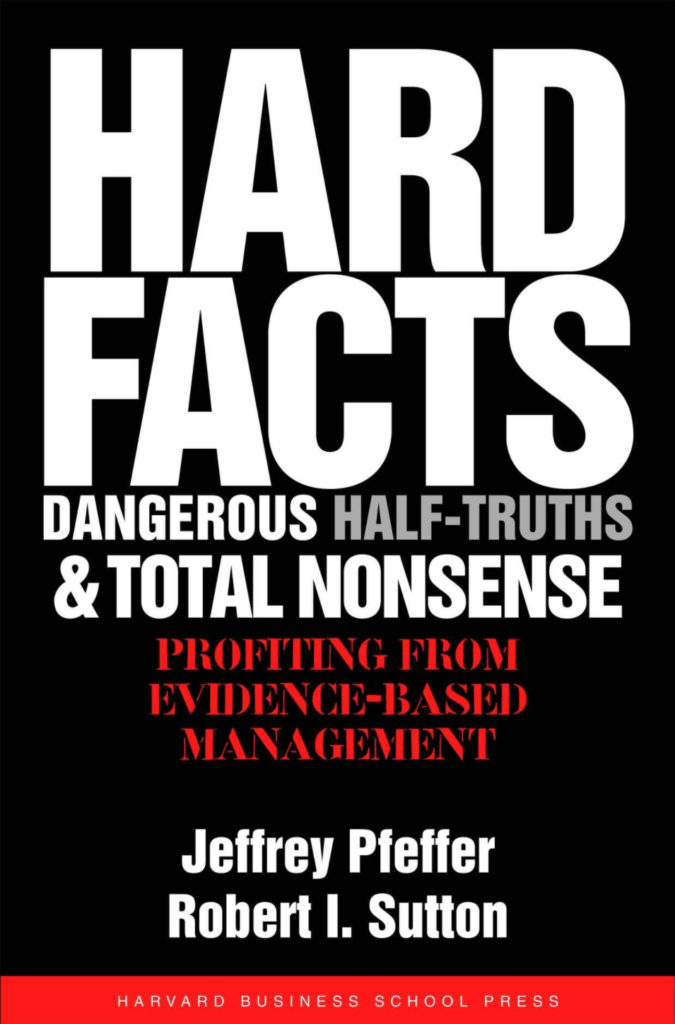Hard Facts, Dangerous Half-Truths And Total Nonsense
 Buy the Book: Amazon, Barnes & Noble, 800ceoread
Buy the Book: Amazon, Barnes & Noble, 800ceoreadTitle: Hard Facts, Dangerous Half-Truths And Total Nonsense: Profiting From Evidence-Based Management
Published by: Harvard Business Review Press; 1 edition
Release Date: March 1, 2006
Pages: 288
ISBN13: 978-1591398622
Overview
The best organizations have the best people. Financial incentives drive company performance. Firms must change or die. Popular nostrums like these guide companies’ everyday decisions. Yet too many business adages are built on flimsy information, “miracle cure” hype, and flawed thinking about “best practices.” When leaders make choices based on inaccurate knowledge, they put their organizations at risk.
It doesn’t have to be that way. Hard Facts describes a better way of making management choices: evidence-based management. Based on an approach that is growing in significance in medicine and the policy sciences and education, this book shows leaders how to find and use better evidence in business and why this approach produces superior results.
Through evidence-based management, business leaders face the hard facts and act on the best evidence—trumping the competition. They also view common beliefs about effective management practices with healthy skepticism. To demonstrate the dangers lurking in such beliefs, Hard Facts examines 6 widely held—but flawed—half-truths in management topics such as leadership, strategy, change, talent management, incentives, and the connection between work and the rest of life. The book describes how to identify and apply the approaches that are best for their companies, rather than blindly embracing what seems to have worked elsewhere. Such guidelines include:
- Beware of old ideas clothed in new labels
- Develop a healthy skepticism toward “the next big management idea”
- Adopt an attitude of wisdom
Praise
“Pfeffer and Sutton attack the paradigms that business leaders have grown to treat as truth, revealing the potential harm of superficiality, half-truths, and slogans. A must read for every business leader.”
—Bob McDonald, Vice Chairmn-Global Operations, Procter and Gamble
“If you have ever wondered whether you can trust what a consultant or author has told you about how to solve a management problem, you absolutely must read this book.”
—Clayton Christensen, Robert and JaneCizik Professor of Business Administration, Harvard Business School, and author of The Innovator’s Dilemma
“Pfeffer and Sutton once again disrobe the emperor of conventional management to reveal the naked truth—companies regularly disregard the evidence in favor of popular platitudes and the truisms of so-called gurus. The authors’ straightforward solution elevates sound management over sound bites and encourages us to sort fact from fiction to arrive at the best answers to build successful businesses.”
—Randy Komisar, Partner, Kleiner Perkins Caufield & Byers, and author of The Monk and the Riddle
“Hard Facts, Dangerous Half-Truths, and Total Nonsense is the operating bible for forward-thinking, high-performing leaders. Pfeffer and Sutton show leaders which advice to take and which to reject, and provide concrete steps that every company can use to gain an advantage over its competitors.
—Ann Rhoades, former VP People, Southwest Airlines; former EVP, JetBlue Airways, President, People Ink
“This book convinced me that the time is ripe for an evidence-based management movement. Just as medical decisions are better for patients when they are based on sound evidence, this same idea ought to be applied to management. Understanding the effects of your actions is critical, and both physicians and leaders who take this scientific approach will do a superior job of practicing their craft.”
—David Kessler, M.D., Dean of the School of Medicine and Vice Chancellor for Medical Affairs, University of California, San Francisco, and former Commissioner, U.S. Food and Drug Administration
Backstory
After Bob Sutton and I wrote The Knowing-Doing Gap and began giving talks on the material, we would confront the following: people would come up to us and tell us the wonderful things they were doing. But often what they would describe were management practices that were doomed to cause problems and that were completely inconsistent with what the evidence suggested they ought to be doing.
We discovered that there was not only a gap between knowing and doing, there was also a big gap in management practice between doing and knowing—that many executives were woefully ignorant of the large, relevant research literature that would help them make better decisions. Inspired by what was going on evidence-based medicine, we decided to start an evidence-based management movement to try and encourage leaders to act on the basis of facts rather than casual benchmarking, belief or ideology, and what they thought made sense or what they had done in the past.
We have discovered that getting managers to learn about and then act on evidence is a challenge, and that implementing evidence-based management is more about a shift in mind set than statistics and data bases. Hard Facts is our attempt to have managers stop making so many mistakes that harm both their companies and their employees.